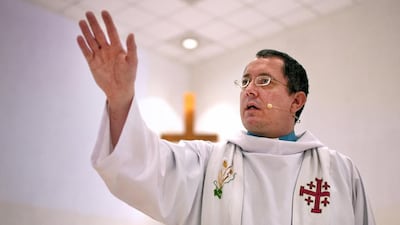This week, I was obliged to consult a dictionary to check the collective noun for a group of bishops. Of the three choices open to me, I shall select a Sea of Bishops to describe a gathering in which I found myself in the company of five bishops, among other guests. The occasion was the launch of a new book, Jesus of Arabia, by Reverend Andrew Thompson, vicar of St Andrew’s church in Abu Dhabi.
The bishops came from the Roman Catholic, Anglican, Greek Orthodox, Syrian Orthodox and Mar Thoma churches, along with clergy from five other denominations, indicating the diversity of the UAE’s Christian communities. It was a real testament to this country’s deep commitment to religious tolerance.
Mr Thompson has already won renown for his book, Christianity in the UAE, which examined both today’s communities and also the history of Christianity in the region. In this latest work, he turns to a topic of broader general interest, a thought-provoking re-examination of the Christian gospels through the prism of Arab and Gulf culture. It is designed, he says, “to spark a conversation … to explore the common ground between the faiths”.
In the foreword, Sheikh Nahyan bin Mubarak, the Minister of Culture, himself an advocate of greater interfaith understanding, argues that Mr Thompson’s “global and all-inclusive vision enables him to breach barriers that normally block rational consideration of Islam and Christianity together”.
With a total of 15 suras and 93 verses of the Quran referring to Jesus, it would seem that there is scope for Muslims to learn more about his teachings, as presented through the Gospels. It has, however, become conventional to overlook their potential relevance.
Was this part of the thinking behind the address by Abdel Fattah El Sisi, Egypt’s president, to the clerics of Cairo’s Al Azhar on New Year’s Day, calling on them to have “a more enlightened perspective?” There was, he said, a need to review “that corpus of texts and ideas that we have sacralised over the years, to the point that departing from them has become almost impossible”.
If, as a corollary, Mr Thompson’s book helps Christians to gain a better understanding of the importance attached to Jesus in Islam, that, too, is to be welcomed. During the heyday of Islamic civilisation, there was much interchange between theologians and scholars. It could hardly have been otherwise, with Christians playing leading roles in, for example, the courts of the Abbasid Caliphs. In more recent times, there appears to have been more discussion of what divides Islam and Christianity than of what they share.
It is within the context of that growing incomprehension that sectarian interpretations have grown up, dramatically displayed today in the corrupted pseudo-theology that characterises groups like ISIL. Part of the campaign against them must, necessarily, involve political and military confrontation. It is also essential, however, as Sheikh Mohammed bin Rashid, Vice President of the UAE and Ruler of Dubai, has noted, to recognise that there is an intellectual battleground too – on which to challenge, and to discredit, their views and ideas.
It is rare in the Arab and broader Muslim world today to find the conditions within which the promotion of a real interfaith dialogue can be carried out, let alone where such a dialogue is encouraged by Government. The UAE, however, is such a place, where the commitment to freedom of belief is not only enshrined in the constitution but also forms a fundamental element of state policy. Indeed, at the G20 summit meeting in Australia late last year, the UAE sent a special delegation to participate in associated discussions on religious freedom and tolerance.
Whatever one may think of Mr Thompson’s book – and I personally believe it to be of great value – the fact that it is published here in the UAE does credit both to its author and to those in Government, like Sheikh Nahyan, who encouraged its publication.
Peter Hellyer is a consultant specialising in the UAE’s history and culture


